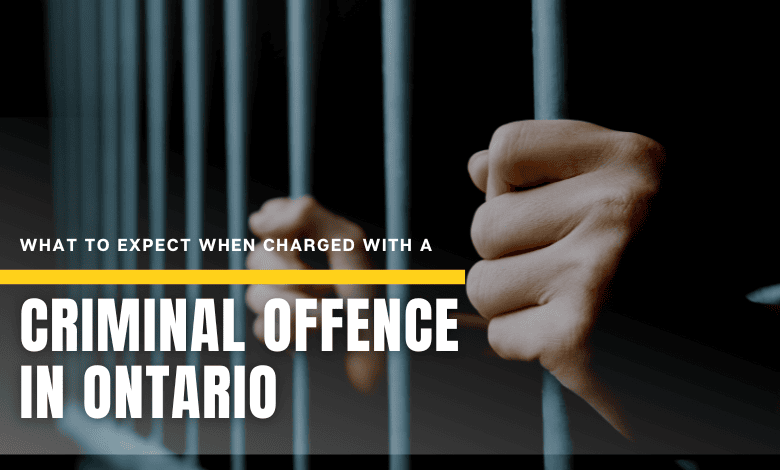What to Expect When Charged with a Criminal Offence in Ontario

Facing a criminal charge in Ontario can be one of the most stressful moments in someone’s life. Whether it’s your first brush with the law or you’ve dealt with the system before, the uncertainty of what comes next can feel overwhelming. The good news is this: understanding the criminal process in Ontario – step by step – can help you make informed decisions and protect your rights.
In this guide, we’ll walk through what typically happens once you’ve been charged, the key rights you have under Canadian law, and why professional legal representation can make a critical difference.
1. The Moment of Arrest or Charge
If the police believe you’ve committed a criminal offence, they may either arrest you on the spot or issue you a summons to appear in court. In Ontario, an “arrest” means you are formally taken into custody, while a “charge” means you are officially accused under the Criminal Code of Canada.
From the first moment of contact, you have the right to remain silent and the right to speak to a lawyer without delay. Exercise these rights politely but firmly. Anything you say to the police can be used against you later in court.
2. Your Rights After Being Charged
In Canada, the Charter of Rights and Freedoms protects anyone facing criminal accusations. Three key rights to keep in mind:
- Right to Silence – You are not required to answer questions about the incident beyond basic identification.
- Right to Counsel – You can speak to a lawyer of your choice or ask for duty counsel if you can’t afford one immediately.
- Right to be Informed of the Charges – Police must tell you exactly what you’re being accused of.
These aren’t just formalities – they are powerful shields to prevent unfair treatment.
3. Release or Bail Hearing
Depending on the seriousness of the allegation, you may be released directly from the police station, sometimes with conditions like no-contact orders or travel restrictions.
If the police do not release you, you will be brought before a judge or justice of the peace for a bail hearing (also known as a “show cause” hearing) within 24 hours. At this stage, your lawyer can argue for your release while you await trial.
4. The First Court Appearance
Your first appearance in the Ontario Court of Justice is often procedural rather than substantive. At this point:
- The Crown (prosecutor) will give your lawyer “disclosure” — the evidence they intend to rely upon.
- No trial has happened yet; the purpose is to set timelines and allow you to review the evidence.
It’s critical to avoid pleading guilty or making hasty decisions before reviewing the disclosure thoroughly with your lawyer.
5. The Disclosure Review & Defence Strategy
This stage is where your defence truly begins. A seasoned criminal defence lawyer in Mississauga will carefully examine every piece of evidence, from police notes to surveillance footage, checking for inconsistencies, procedural mistakes, or breaches of your rights.
Strategies might include:
- Negotiating with the Crown to withdraw or reduce charges.
- Filing motions to exclude unlawfully obtained evidence.
- Preparing for trial if resolution isn’t possible.
Many people choose to work with a trusted local team like CSN Law Professional Corporation, where lawyers combine legal skill with a client‑first approach.
6. Possible Paths Forward
Every case is unique, but most charges in Ontario follow one of these paths:
- Withdrawal of Charges — if the Crown concludes there is insufficient evidence.
- Peace Bond — agreeing to certain conditions for a set time, after which charges are dropped.
- Plea Agreement — pleading guilty to a lesser offence for a lighter sentence.
- Trial — contesting the charges before a judge, and sometimes a jury.
7. Why the Right Lawyer Matters
Ontario’s criminal justice system is complex. Laws are federal, but procedures can vary slightly between courthouses, prosecutors, and judges. This is why working with an experienced local advocate is so valuable. A reputable criminal law firm will not only understand the statutes but also the local court culture, giving you a strategic advantage.
For many in the community, finding representation they can truly connect with is just as important. For example, if English isn’t your first language and you feel more comfortable in Punjabi, you might prefer working with a Punjabi criminal lawyer who understands both your cultural background and the legal landscape.
8. Staying Proactive Throughout the Process
While your lawyer will handle the legal heavy lifting, you can help your case by:
- Staying organized — keep all court documents, bail conditions, and communication from your lawyer in one place.
- Following bail and release conditions strictly.
- Avoid social media commentary about your case.
- Showing up early for every court date.
9. Emotional and Practical Support
A criminal charge doesn’t just affect you legally; it can impact your job, family life, and mental health. Seeking counselling, leaning on trusted friends and family, and staying informed about your case can reduce the stress. Remember, being charged does not mean you are guilty — the presumption of innocence is a cornerstone of Canadian justice.
Final Thoughts
If you’ve been charged with a criminal offence in Ontario, time and informed action are your best allies. The sooner you reach out to a skilled legal professional, the stronger your defence will be. Whether you’re looking for a respected criminal lawyer in Mississauga, a specialized firm with decades of experience, or a trusted advocate who understands your needs, choosing the right team matters.
At CSN Law Professional Corporation, the focus is always on protecting clients’ rights with skill, compassion, and determination — because every case deserves a fair fight.
